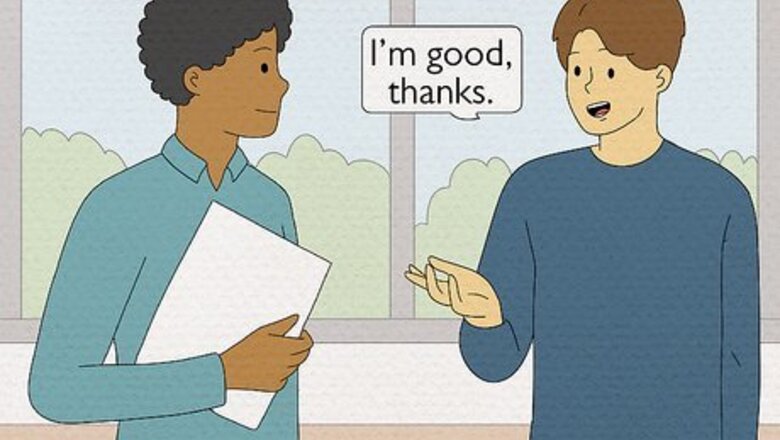
views
Giving a Brief, Standard Response
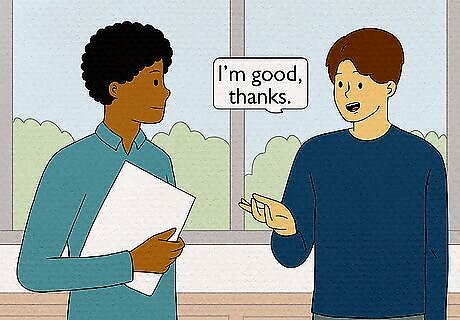
Respond with “Fine, thanks” or “I’m good, thanks." You can use these responses if you are speaking to someone in a social situation you do not know well, such as an acquaintance at a party or someone you have just met while out and about. You can also use these responses if you are talking to someone at work, such as a coworker, a client, or your boss.
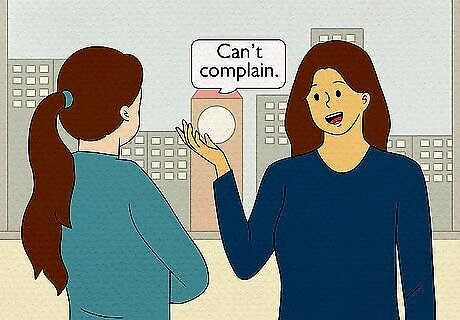
Answer with “Not bad” or “Can’t complain” if you want to come across positive and friendly. You can also say “Not too shabby” or “Things are good.” These responses are a good way to present a positive demeanor to a coworker, a client, a boss, or an acquaintance.
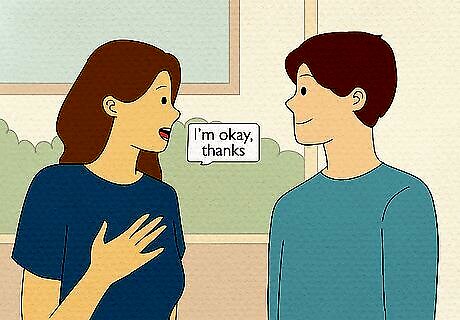
Say “I’m okay, thanks” if you aren’t feeling well but want to be polite. If you are feeling ill or a little sick, you can use this response to let the person know this in a polite way. The person can then move on with the conversation or ask you more probing questions. This is a good response if you do not want to lie about how you are feeling, but you do not want to be too honest or personal with the person.

Make eye contact with the person when you respond. Engage with them by looking them in the eye when you answer their question, even if you are trying to be polite or brief with your response. Keep your arms relaxed by your sides and your body turned towards them to demonstrate positive body language. This will make them feel more at ease in the conversation. You can also smile or nod if you want to appear friendly.
Providing an Answer to Encourage Conversation
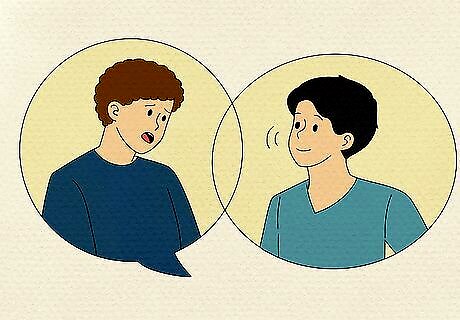
Give a detailed answer when responding to a close friend, a family member, or your partner. These are likely individuals you are close with and trust on a personal level. Tell them how you are feeling in a more meaningful and detailed way. You may also be honest and tell a coworker or peer you are close with how you are actually feeling.
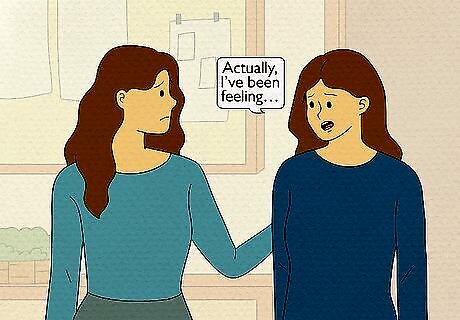
Express how you are feeling. Respond by saying, “Actually, I’ve been feeling…” or “You know, I have been feeling…” If you are feeling depressed or going through a tough time, you could also mention that so that your loved ones can help you. For example, you may respond, “Actually, I’ve been feeling a little down lately. I think I might be struggling with stress and anxiety” if you have not been feeling well or like yourself. You may respond, “You know, I’ve been feeling great. I finally have a job I love and I’m feeling more confident these days” if you are feeling positive and happy.
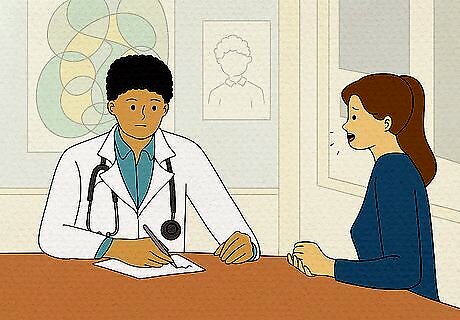
Provide a detailed response when your doctor asks “How are you?” Let them know if you are not feeling well or have a health issue that has been bothering you, as this will allow them to treat you properly. You should also give an honest answer to any other medical professionals, such as a nurse or a paramedic. If you are not feeling well, they need to know that so they can help you to feel better.
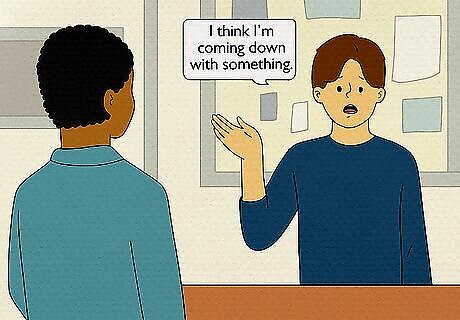
Say “Not great” or “I think I’m coming down with something” if you are feeling ill. This response will allow you to be honest and let the person know you are not feeling well. They may then ask you more questions and show sympathy for how you are feeling. Only use this response if you want to talk about your sickness or illness with the person. It is usually a prompt for the other person to find out more and try to make you feel better.
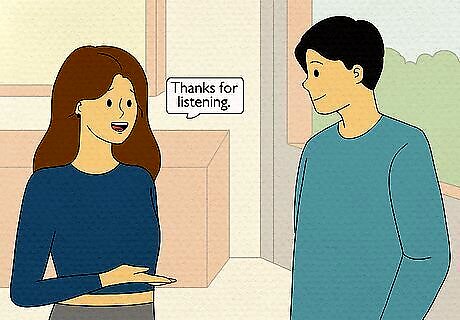
Wrap up your response with “Thanks for asking.” Let the person know you appreciate their question and their willingness to listen to your long answer. This is a good way to end your response on a positive note, even if your response was about how you are feeling negative or not well. You can also say, “I appreciate that you asked how I was, thank you” or “Thanks for listening.”
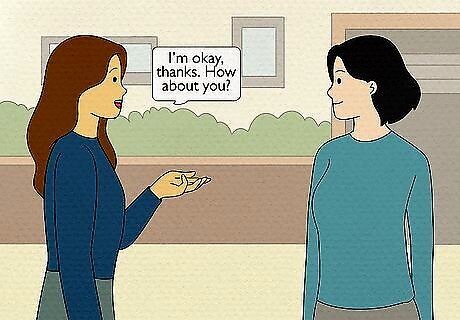
Ask the person how they are doing. Show the person you want to engage in deeper conversation by asking “How are you?” once you have responded to their question. For example, you may say, “I’m fine, thanks for asking. How are you?” or “I’m okay, thanks. How about you?” For some people, if you ask them the same question, they may nod and say "I'm good" or "I'm fine" and then be on their way. Don't be discouraged; asking how someone is doing is sometimes not taken as a real invitation to say much.
Reading the Situation Properly
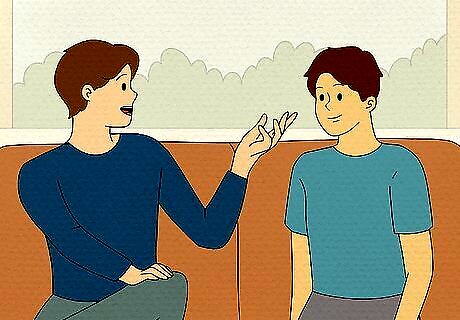
Take into account your relationship with the person. If you are close to the person and have spoken to them about personal experiences or feelings before, it may make sense for you to give them a detailed answer. If you do not know the person well, such as someone you work with or know through a friend or family member, you may keep your response brief and polite. You may give a detailed answer if you want to develop your relationship with the person on a deeper level and become closer to them. Be cautious about opening up just because you feel awkward and don't really feel close to the person.

Notice when and where the person asks “How are you?” If the person asks you at work at the coffee machine, they may expect a brief, polite answer that is appropriate for an office setting. If the person asks you over drinks or dinner after work or school, you may give them a more detailed, personal answer. If you are around others in a group setting, you may opt for a brief, polite response as you it may not be appropriate for you to give a long winded or personal answer in front of others. In most cases, if you are among friends or family, giving a detailed response may be okay. If you are around coworkers, peers, or authority figures, a more polite, short response may be the way to go.

Pay attention to the person’s body language. Notice if the person maintains eye contact with you and stands still, with their body turned towards you. These are usually signs the person wants to connect with you on a deeper level and have a conversation with you. If the person does not make eye contact or brief eye contact and is walking by you, they may not be interested in a long chat. In this case, you may opt for a brief, short response so the situation does not become awkward.

















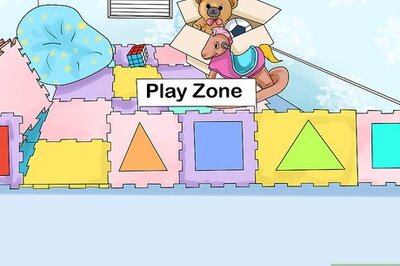


Comments
0 comment